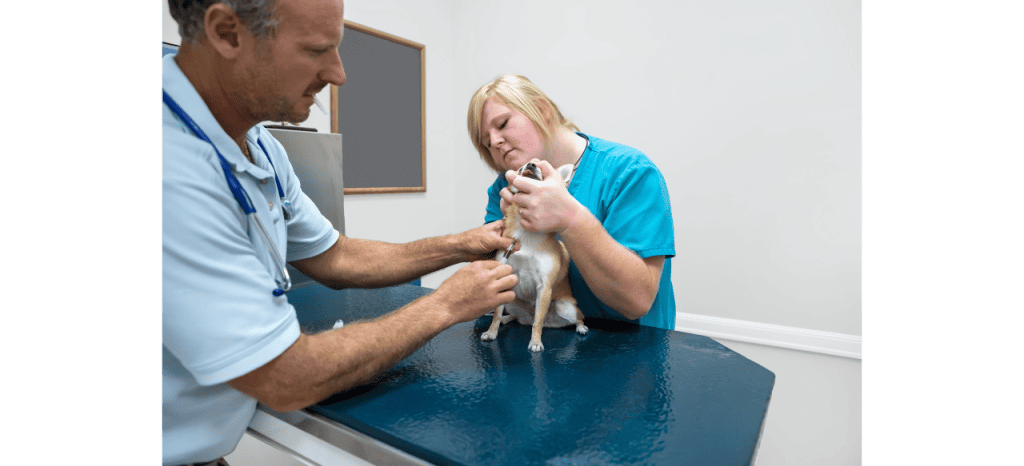When caring for our furry friends, their health is of utmost importance. Heartworm disease is a severe and potentially fatal condition that can affect dogs. But the good news is that it’s treatable! In this article, we’ll delve into dog heartworm treatment costs, shedding light on what you can expect and how to ensure your beloved canine companion receives the best care without breaking the bank.
The Importance of Heartworm Prevention
Prevention is the cornerstone of responsible pet ownership, and it also holds for heartworm disease. Heartworm preventives are crucial to your dog’s overall well-being, and their significance cannot be overstated. These monthly medications serve as a shield against a potentially life-threatening condition, and their regular use is a proactive step toward safeguarding your pet’s health.
Consulting with your veterinarian regarding heartworm prevention should be emphasized more. Veterinarians are well-equipped to guide you in selecting the most appropriate preventive medication for your dog, considering factors such as breed, age, and geographic location. Their expertise ensures your pet receives the most effective protection tailored to their needs.
By adhering to a routine of monthly heartworm preventives, you not only shield your dog from the misery of heartworm disease but also save yourself considerable expenses in the long run. The costs associated with heartworm treatment, as mentioned in the previous sections, can be substantial and may include diagnostics, hospitalization, medications, and follow-up care. In addition to the financial burden, treating a dog with advanced heartworm disease is emotionally taxing and can be physically grueling for your pet.

Preventive medications, on the other hand, are comparatively cost-effective. They are available in various forms, including chewable tablets and topical applications, making finding a suitable option for your dog easy. The price of these monthly preventives is a fraction of the cost of treating a heartworm-infected dog, and the peace of mind they provide is invaluable.
Furthermore, the adage “an ounce of prevention is worth a pound of cure” certainly applies here. Heartworm preventives protect your dog from heartworm disease and other parasitic infections, such as intestinal worms. This comprehensive protection contributes to your dog’s overall well-being and reduces the likelihood of additional veterinary expenses related to parasitic infections.
Cost of Routine Veterinary Visits
Regular check-ups with your veterinarian are fundamental to responsible dog ownership and are vital in maintaining your pet’s overall health and well-being. These routine visits serve as a proactive means of identifying and addressing potential health issues before they become major concerns.
Among the various tests and examinations that your veterinarian may recommend during these check-ups, heartworm testing stands out as a critical component, especially in regions where heartworm disease is prevalent. Heartworm testing is a straightforward and relatively inexpensive procedure, with costs generally ranging between $15 and $35.
The primary objective of heartworm testing is to detect the presence of heartworm antigens or microfilariae in your dog’s blood. These are indicative of an active heartworm infection. Identifying heartworm disease in its early stages is particularly advantageous. When detected early, the disease is more treatable and associated with a higher success rate in treatment.

By performing this test as part of your dog’s regular check-ups, you and your veterinarian can avoid any potential health threats that heartworms pose. This early detection facilitates timely intervention and significantly reduces the risk of complications and the associated financial burden of advanced-stage heartworm treatment, which can be considerably more expensive.
It’s important to note that even if your dog is on a preventive medication regimen, regular heartworm testing is still advisable. No preventative is 100% foolproof, and the testing ensures your dog remains protected. Additionally, it’s a means of fulfilling your role as a responsible pet owner, as it helps prevent the spread of this severe disease to other dogs in your community.
Diagnosing Heartworm Disease
Once your dog tests positive for heartworm, it’s essential to proceed with further diagnostic measures to confirm the diagnosis and assess the severity of the disease. This step is critical for planning the appropriate treatment and care for your pet. The diagnostic process involves a combination of blood tests, X-rays, and other procedures designed to provide a comprehensive understanding of the heartworm infection.
Blood tests are a crucial component of the diagnosis. They help determine the presence of heartworm antigens in your dog’s bloodstream. Adult female heartworms release these antigens and clearly indicate an active infection. Blood tests are usually among the first diagnostic tools veterinarians employ in cases of suspected heartworm disease.
X-rays are another essential aspect of the diagnostic process. They allow the veterinarian to visualize the heart and lungs, assessing the extent of damage and the presence of adult heartworms. The severity of the disease is often correlated with the number and size of these worms and the damage they have caused to the cardiovascular and respiratory systems.

Additional diagnostic procedures may also be necessary. These can include ultrasounds to examine the heart and lungs and echocardiograms further to evaluate cardiac function and identify any complications or abnormalities.
The cost of these diagnostic tests can vary based on factors such as the veterinary clinic’s geographical location, the diagnostic process’s complexity, and the specific tests required. You can expect to pay between $100 and $300 for these diagnostic tests. Remember that these costs are in addition to the expenses associated with heartworm treatment.
It’s crucial to understand that while these diagnostic tests can add to the financial burden of treating heartworm disease, they are indispensable for making informed decisions about treatment. The results of these tests guide the veterinarian in tailoring the treatment plan to your dog’s specific needs and the disease’s severity, increasing the likelihood of a successful outcome.
The Price of Heartworm Treatment
The cost of treating heartworm disease is a variable figure influenced by several key factors, and understanding these factors is crucial when considering the financial implications of treating this condition.
- Size of Your Dog: One of the most significant factors affecting the cost of heartworm treatment is the size of your dog. Larger dogs typically require larger doses of medications and may need more intensive care during treatment. This means that treatment costs can be considerably higher for larger breeds. Conversely, smaller dogs may incur lower treatment expenses due to reduced medication requirements and less complex care needs.
- Stage of the Disease: The stage at which heartworm disease is diagnosed is pivotal in determining the overall treatment cost. Heartworm disease has four stages, ranging from mild to severe. Treatment is generally less invasive and costly in the early stages (Stages 1 and 2). As the disease progresses to more advanced stages (Stages 3 and 4), treatment becomes more complex and expensive due to the increased potential for damage to the heart and lungs.
- Geographical Location: The cost of heartworm treatment can also vary significantly depending on where you live. Veterinary care costs differ from region to region, influenced by factors like the cost of living, demand for veterinary services, and local economic conditions. Therefore, the same treatment may cost more in one area compared to another.

Treating heartworm disease typically ranges from $500 to $1,500 or more. This cost encompasses various components, including medications, hospitalization, and follow-up visits.
- Medications: Heartworm treatment generally involves a series of injections of an arsenic-based medication to kill adult heartworms. The cost of these medications can vary depending on the size and health of the dog.
- Hospitalization: Treating heartworm disease often necessitates hospitalization. This is because the medications used can cause severe reactions, and close monitoring is crucial. The duration of hospitalization can vary based on the severity of the infection and how well the dog responds to treatment. More extended hospital stays can increase the overall cost.
- Follow-Up Visits: After the initial treatment, your dog will require follow-up visits to assess their progress and ensure effective treatment. These visits are essential for monitoring your dog’s recovery and may include additional tests or medications. The cost of follow-up visits can contribute to the overall expense.
Staging and Severity
The progression of heartworm disease significantly impacts both the cost and the success rate of treatment. Heartworm disease is staged from one to four, with each stage indicating the severity of the infection. Understanding the disease’s stage is crucial in determining the most appropriate treatment approach.
As the disease advances to higher stages, it becomes more complex and costly to treat. This is because, in advanced stages, adult heartworms have had more time to mature and reproduce. As a result, a more significant number of worms may be present in the dog’s heart and lungs. These adult worms cause more substantial damage to these vital organs, making treatment more challenging and necessitating a v more extended recovery period.

In early-stage heartworm disease (Stages 1 and 2), the infection is less severe, as there are fewer adult worms, and they have not yet caused extensive damage to the heart and lungs. Treatment for dogs in these stages is generally less costly and has a higher success rate. The procedures required for treatment are typically less invasive, and the potential for complications is reduced.
Treating early-stage heartworm disease often involves medications to kill the adult worms and strict rest and exercise restrictions to minimize stress on the dog’s cardiovascular system. This combination of medical treatment and careful management can lead to successful outcomes, with many dogs recovering well.
In contrast, advanced-stage heartworm disease (Stages 3 and 4) necessitates more extensive and invasive treatments, such as surgery or other specialized procedures, to address the damage caused by the worms. These treatments are more complicated and carry a higher risk of complications and side effects.
Medication and Hospitalization
The treatment of heartworm disease is a multi-step process that aims to eliminate adult heartworms in a dog’s heart and lungs. The primary method for accomplishing this is using an arsenic-based medication, an adulticide. This medication is administered through a series of injections, and it plays a pivotal role in killing adult heartworms.
These adulticide injections must be administered with precision and care in a controlled environment, typically in a veterinary clinic or hospital. This controlled setting is necessary because the treatment can provoke severe reactions in some dogs. These reactions can range from mild discomfort to potentially life-threatening complications, and immediate access to medical care is crucial. As a result, hospitalization is typically required during the treatment process to ensure the dog’s safety and provide direct intervention if any adverse reactions occur.

The cost of these injections and the associated hospitalization can vary significantly depending on several factors:
- Geographical Location: The cost of veterinary care varies by region and even by individual clinics within the same area. Areas with a higher cost of living or greater demand for veterinary services may charge more for the treatment.
- Clinic Reputation: Established and reputable veterinary clinics may charge more for their services, reflecting their experience and expertise in treating heartworm disease.
- Size of the Dog: Larger dogs require larger doses of the adulticide medication, which can increase the cost of treatment.
- Severity of the Infection: Dogs with more advanced heartworm disease may require more intensive care and a more extended hospital stay, contributing to higher costs.
- Additional Care: Some dogs may need extra care, medications, or diagnostic tests during treatment, adding to the overall expense.
It’s important to note that while the cost of heartworm treatment can be substantial, it is a necessary investment in your dog’s health and well-being. Successful treatment can save your dog from the life-threatening effects of heartworm disease and give them a chance at a healthier and longer life.
Post-Treatment Care
The journey to recovery from heartworm disease doesn’t end with the administration of adulticide medication and the hospitalization period. Post-treatment care is crucial in ensuring your dog’s successful recovery and long-term well-being.
Following the treatment, your dog will need careful monitoring and follow-up visits with your veterinarian. These follow-up visits are essential to assess your dog’s progress and ensure they are recovering well. The veterinarian will closely examine your pet to check for any residual heartworms or complications and monitor their overall health.
The frequency and number of follow-up visits can vary depending on the dog’s condition and the veterinarian’s recommendations. Sometimes, several follow-up appointments may be necessary to ensure that the heartworms have been eliminated and that your dog’s body is healing appropriately.

While the cost of follow-up visits is generally lower than the initial treatment, it’s essential to be prepared for these additional expenses. The cost of follow-up visits can vary depending on several factors, including the geographical location, the clinic’s pricing, and any specific tests or procedures required during the post-treatment monitoring. In many cases, the cost of each follow-up visit can amount to a few hundred dollars.
While these additional expenses may add to the overall cost of treating heartworm disease, they are vital to the recovery process. The thorough monitoring and assessment provided during these follow-up visits help ensure that your dog is on the path to complete recovery and can resume a healthy and active life.
Prevention is Key
After successfully treating heartworm disease in your dog, the journey towards recovery and long-term health is far from over. Establishing and maintaining a consistent heartworm prevention regimen is vital to ensure that your beloved canine companion does not suffer a recurrence of this potentially life-threatening condition.
Heartworm preventives are available in various forms, such as chewable tablets, topical solutions, and injectables. They are designed to be administered monthly, providing a continuous shield against heartworm infection. These preventives work by eliminating the immature heartworm larvae (microfilariae) transmitted by infected mosquitoes before they can develop into adult worms in the dog’s heart and lungs.
These monthly heartworm preventives cost significantly less than the expenses associated with treating heartworm disease. Preventives typically range in price from $5 to $15 per month, depending on the type and brand of medication, the size of your dog, and your geographical location. This relatively modest investment is an insurance policy for your dog’s long-term health.

Beyond being cost-effective, heartworm preventives offer a multitude of benefits. They protect your dog from heartworm disease and shield them from other parasitic infections, such as intestinal worms. Maintaining a consistent prevention regimen ensures that your dog remains free from these parasitic threats, contributing to their overall health and well-being.
The most significant advantage of heartworm prevention is the peace of mind it provides. Knowing that your dog is safeguarded against heartworm disease alleviates the stress and financial burden associated with heartworm treatment. It also affords your pet a higher quality of life, as they can remain active and healthy without worrying about heartworm infection.
Furthermore, heartworm preventives are convenient and readily available through your veterinarian or pet supply stores. They are easy to administer and are generally well-tolerated by dogs. Many pet owners incorporate the monthly administration into their routine, making it a simple and effective way to protect their furry family members.
Financial Assistance and Insurance
The financial burden of heartworm treatment can cause concern for many pet owners. Fortunately, options and resources are available to help alleviate some of the financial strain associated with this critical aspect of pet healthcare.

- Financial Assistance Programs: Some organizations and non-profits are dedicated to helping pet owners facing financial difficulties. They offer financial assistance or grants specifically for heartworm treatment. These programs can help cover a portion or, in some cases, the entire cost of treatment. Contact local animal welfare organizations and veterinary clinics to inquire about available assistance programs.
- Veterinary Payment Plans: Many veterinary clinics understand the financial challenges that pet owners may face and offer payment plans. These plans allow you to spread the cost of heartworm treatment over some time, making it more manageable. Speak with your veterinarian to discuss setting up a payment plan to cover the expenses.
- Pet Insurance: Pet insurance can be valuable for covering unexpected veterinary expenses, including heartworm treatment. Different pet insurance policies offer varying coverage levels, so choosing a plan that suits your needs and budget is essential. Some policies cover a portion of the treatment costs, while others may cover prescription medications.
- Non-Profit Organizations: Some non-profit organizations, such as the American Animal Hospital Association’s “Helping Pets Fund,” assist needy pet owners. These organizations aim to ensure that pets receive the necessary care, even when financial constraints exist. Research local and national organizations that may offer support.
- Discounted Clinics and Low-Cost Services: Some veterinary clinics, particularly those affiliated with animal shelters or welfare organizations, may offer lower-cost veterinary services, including heartworm treatment. While they may not cover the entire expense, these clinics can provide cost-effective options for treatment.
- Pharmaceutical Rebates: Some pharmaceutical companies that manufacture heartworm preventives and treatment medications offer rebate programs or discounts for pet owners. These programs can help offset the cost of heartworm medications. Check with your veterinarian or visit the manufacturer’s website for information on available rebates.
- Crowdfunding: In the internet age, crowdfunding platforms such as GoFundMe and YouCaring have been used by pet owners to raise funds for their pet’s medical expenses, including heartworm treatment. These platforms allow you to share your story and financial needs with friends, family, and even sympathetic strangers who may be willing to contribute.
Choosing the Right Veterinarian
The Significance of Choosing the Right Veterinarian
Selecting the right veterinarian for your dog’s heartworm treatment is a critical decision that cost considerations should not solely influence. While financial aspects are essential, your chosen veterinarian’s expertise and compassionate care play a pivotal role in ensuring the best possible outcome for your pet.
Expertise in Heartworm Treatment
Heartworm disease is a complex condition, and its treatment demands a deep understanding of the disease, the medications used, and the specific needs of dogs at different stages of infection. An experienced veterinarian is well-versed in these complexities and can make informed decisions regarding diagnosis, treatment protocols, and follow-up care.
Additionally, heartworm treatment may involve administering medications that can have side effects and reactions in some dogs. A knowledgeable veterinarian is better equipped to manage these situations, making the treatment process safer and more effective. They can also guide how to prevent complications during and after treatment.
Compassion and Communication
Beyond expertise, finding a veterinarian who demonstrates compassion and effective communication is crucial. Dealing with heartworm disease can be emotionally challenging for you and your pet. A compassionate veterinarian will prioritize your dog’s physical health and provide emotional support to you and your furry companion during this difficult time.
Effective communication is also crucial in understanding the treatment plan, follow-up care, and financial aspects. A good veterinarian will explain the treatment process clearly, discuss the associated costs, and work with you to create a plan that aligns with your budget and your dog’s needs.

Assessing Veterinarian Options
When selecting a veterinarian for heartworm treatment, consider the following steps:
- Research: Begin by researching local veterinary clinics. You can ask for recommendations from friends, family, or even online communities of pet owners. Check reviews and ratings to gauge the reputation of different clinics.
- Consultations: Arrange consultations with prospective veterinarians. During these visits, discuss their experience with heartworm treatment, their treatment approach, and the estimated costs involved.
- Ask Questions: Don’t hesitate to ask about the treatment process, including diagnostics, medications, and post-treatment care. A competent veterinarian will be willing to provide detailed explanations.
- Consider Your Dog’s Comfort: Assess the clinic’s facilities and staff to ensure your dog will be comfortable and well-cared for during treatment and recovery.
- Financial Arrangements: Discuss payment options and financial arrangements. Some veterinarians may offer payment plans or recommend financial assistance programs.
- Trust Your Instincts: Ultimately, trust your instincts. The chosen veterinarian should be knowledgeable and genuinely care about your pet’s well-being and be someone you feel comfortable communicating with.
Conclusion
Understanding the costs associated with dog heartworm treatment is vital for responsible pet ownership. Prevention is always the most cost-effective approach, but early detection and treatment are critical if your dog contracts heartworm disease. Remember that your dog’s health is priceless, and providing them with the best care possible is a testament to your love and bond.

